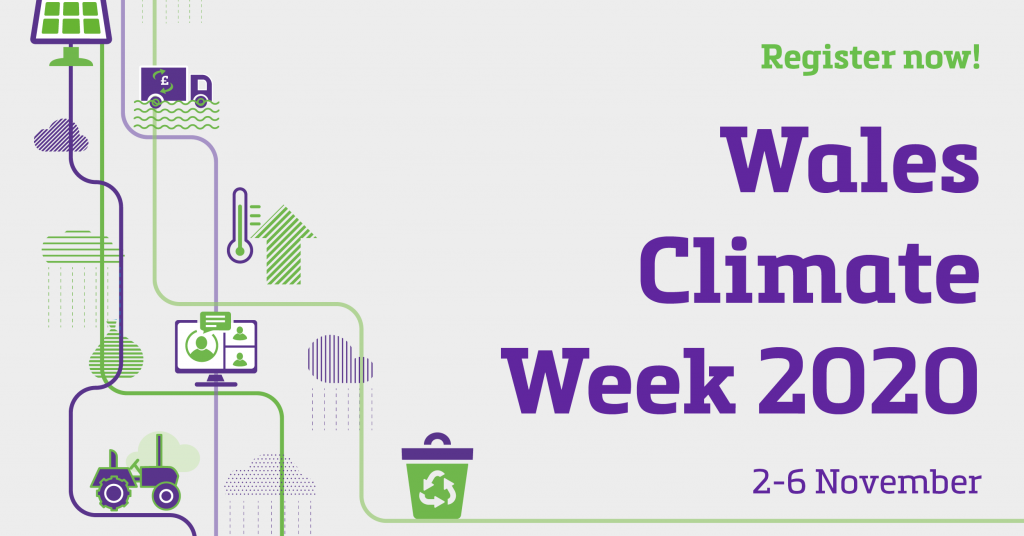
Covid versus the environment: a battle no-one wants to see
The year 2020 will, no doubt, be synonymous with the ‘C’ word – Covid-19 – as we all grapple to adapt to the new normal as best we can.
It’s a challenge for most – a life and death struggle for some – but the reality is that while Covid-19 may be weighing heavily on our hearts and health, it should not be allowed to draw our attention away from two other ‘C’ words: climate change.
The Welsh Government is putting this important issue in the spotlight at its second Wales Climate Week conference. The event took place for the first time in 2019 but will happen virtually this year from 2-6 November. Its purpose is to move Wales towards becoming a more sustainable nation and will consist of free, virtual, live broadcasts and interactive events from national and global policy makers, pioneers and innovators. Together, they will be zeroing in on the actions needed for tackling the climate emergency in the context of a global pandemic.

As it stands, Wales can be proud that in recent years we have either reached or surpassed a number of significant environmental goals.
Figures from the Welsh Government show that we remain on track for the 2020 interim emission reduction target of 27%, and that in 2018 we saw a fall in emissions of 31% when compared to base emissions, and eight per cent when compared to the previous year. In the same year, half of Wales’ demand for electricity was met using renewable energy and our overall energy usage has reduced by 21 per cent since 2005.
So, what impact has the pandemic had on environmental matters? Has it helped or hindered our progress? It’s certainly true that global lockdowns have had some positive effects on the environment. We’ve all heard stories of how the Himalayas were visible in the distance from northern India for the first time in a generation as pollution levels plummeted, or how fish could be seen in the usually-murky Venice canals following a drastic drop in water traffic.
But, as ever, there’s another side to the story. For single-use plastic, for example, the restrictions required to manage Covid-19 have resulted in some really damaging backward steps on an issue many of us were beginning to tackle.
Safety measures led to some of the big coffee house chains temporarily banning the use of reusable cups, while sales for hand sanitiser in small bottles went through the roof. In addition, much of the PPE we are seeing used in hospitals, care homes and shops are single use by design – and necessarily so.
But the issue is much wider than single use plastics. As economies open back up, the rush for industry to make up for lost time will no doubt see pollution return, as has happened in China. And the once quiet roads and skies will soon be busy again, as travel restrictions eventually ease. Some are even saying that more people will take to the relative safety of their cars for commuting and getting around, rather than risk busier trains and tubes, where social distancing is less easy to maintain.
The issues are complex – but, thankfully, there are grounds for optimism. Work undertaken by global public opinion specialists, IPSOS, in a report for the United Nations, suggests that, on the whole, the world hasn’t lost sight of the bigger environmental picture.
Their recent study found that 71 per cent of people globally agree that, in the long term, climate change is as serious a crisis as Covid-19. Sixty-five per cent of people support a ‘green’ economic recovery from the Covid-19 crisis, while 79 per cent of respondents also said that they will seek out products that are healthier and better for the environment.
So, it seems that most of us still want to do our bit. If you, like me, find yourself at your desk for much of the day, perhaps this tip could come in handy: ‘think before you thank.’ Apparently, if every person in the UK sent one less thank you email a day, we would save 16,433 tonnes of carbon a year – the same as 81,152 flights to Madrid.
Tackling climate change needs a team approach. As we look to the future and brighter days post Covid-19, let’s all do what we can to take positive steps, no matter how small, towards meeting Wales’s climate change targets.
To take part in the free events of Wales Climate Week, visit https://waterfront.eventscase.com/EN/walesclimateweek
This article was written by our Chief Executive, Angharad Neagle, and appeared in the Western Mail newspaper on 3 November 2020.
